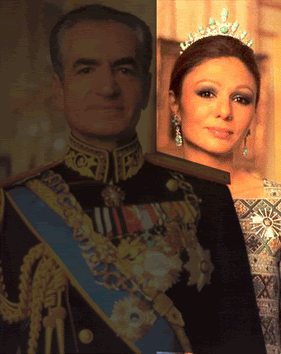 With 2009 marking the 20th anniversary of the Iranian Revolution that ousted the Shah and replaced the monarchy with a theocratic regime, it’s fitting Mongrel Media released The Queen and I this month, Nahid Persson Sarvestani’s 2008 documentary on Empress Farah, Iran’s exiled Queen, now living in Paris, France.
With 2009 marking the 20th anniversary of the Iranian Revolution that ousted the Shah and replaced the monarchy with a theocratic regime, it’s fitting Mongrel Media released The Queen and I this month, Nahid Persson Sarvestani’s 2008 documentary on Empress Farah, Iran’s exiled Queen, now living in Paris, France.Sarvestani was a Communist who supported the regime change, but she found herself and her family put in harm’s way when the ruling theocracy started to wipe out opposing political parties to ensure its total domination of the populace. She subsequently fled to Sweden, and eventually made a documentary about the surviving monarch - a person representing aspects of a painful past.
The making of the film created some fascinating inner conflicts for the director, because she slowly fell for the Queen’s charm - something that in turn affected the film’s focus and conclusion.
As flawed as The Queen and I may be, it’s a rare glimpse into a forgotten slice of Iran’s past, and most likely when the Empress has passed away, the country’s royal history will become a biographical footnote, except to loyal monarchists who hope the royal family will one day return and govern the country.
That wish is perhaps more self-serving, because it’s more about the fans wanting to return to a world, glamorous lifestyle, wealth, and social status that no longer exists. One is also aware of Sarvestani’s discomfort when she attends a monarchists gathering, and is surrounded by fans in a room filled with iconography and portraits of long-gone figures and the Empress’ now-graying children.
The affection these folks have for the royal family is understandable, and their fantasy is no different than the dwindling societies who dream of the reinstatement of their own lost monarchies, such as the Russian dynasties, but it just ain’t gonna happen.
Ultimately unsatisfying, Sarvestani’s film does raise the issue of a younger generation – those born shortly before or after the Revolution – who have few if any memories of the regime, yet share a fascination if not fondness for the royal family, and perhaps are oblivious (perhaps voluntarily) to the Shah’s dark side.
Also reviewed this week is a 2004 documentary on The Iranian Embassy Siege (MVD Visual) in London, wherein members of a minority Arab population in southern Iran took over the embassy and held staff and visitors hostage for six days until the British secret service burst in, commando style, and put an end to the mess. Organized and supported by the Iraqi secret service, the siege was meant to aggravate Iraq’s existing disputes with Iran, and preceded the Iran-Iraq War by a few months.
Filmmaker Robert Garofalo interviewed two survivors of the siege, as well as a British secret service agent who participated in the liberation, and interspersed their comments with archival news and government negotiation footage.
- MRH







0 comments:
Post a Comment